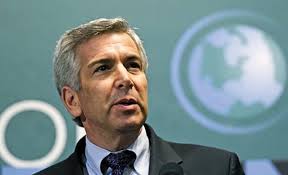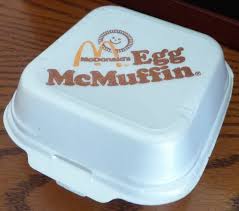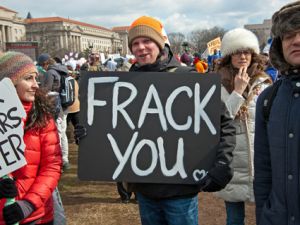The Environmental Defense Fund (EDF) originally made its name by using court cases to protect the environment. Its motto when it began in 1967 was "sue the bastards". It took the US Environmental Protection Agency (EPA) to court over the spraying of DDT and its impact on osprey populations and eventually got it banned in 1972. Other EDF lawsuits achieved laws on lead in petrol and flame retardants in children's sleepwear.
However when zealous EDF lawyers began successfully suing companies "with close associations to foundation trustees", the "sue the bastards" approach was dropped as were the zealous lawyers. The Ford Foundation began screening cases being considered by EDF and other environmental law firms funded by Ford.
Not surprisingly, environmental litigation gradually became less and less aggressive, settlement and deal making became popular, and the fighting spirit that characterized the early days disappeared... Law schools offering environmental curricula now attract students who expect to defend corporations...
 By the 1980s lawsuits were not filling the EDF coffers and it was in debt. In 1984 Fred Krupp (pictured) was hired to turn the fortunes of EDF around (He remains EDF president today). Krupp, in turn hired economists to join the scientists and lawyers already employed by EDF and led the organisation into a new era of corporate partnerships and market-based environmentalism. According to EDF's website:
By the 1980s lawsuits were not filling the EDF coffers and it was in debt. In 1984 Fred Krupp (pictured) was hired to turn the fortunes of EDF around (He remains EDF president today). Krupp, in turn hired economists to join the scientists and lawyers already employed by EDF and led the organisation into a new era of corporate partnerships and market-based environmentalism. According to EDF's website:
Not long after, we began hiring economists, which led to our international prominence in designing market-based solutions. In the 1990s, we pioneered corporate partnerships and some of the first interactive uses of online communications. In the process, EDF has grown into a leading national nonprofit organization representing more than 750,000 members.
EDF's membership do not have voting rights. "Inc. magazine
praised president Fred Krupp for his ability to 'speak capitalism'."
Corporate partners have included McDonalds, Walmart, Ocean Spray, FedEx and AT&T. EDF's board also has a good share of investors and corporate and foundation executives.
 One of EDF's earliest partnerships was with McDonalds. McDonalds had been under attack for its styrofoam packaging of hamburgers (pictured), in a concerted grassroots campaign coordinated by The Citizens Clearinghouse on Hazardous Waste: "Groups picketed restaurants, fought for local ordinances banning styrofoam, launched boycotts and engaged in "send-it-back" campaigns." Rather than be seen to be giving in to confrontational activists, McDonalds made a compromise deal with EDF in 1990 to change its packaging from styrofoam to coated paper, made from bleached, unrecycled paper.
One of EDF's earliest partnerships was with McDonalds. McDonalds had been under attack for its styrofoam packaging of hamburgers (pictured), in a concerted grassroots campaign coordinated by The Citizens Clearinghouse on Hazardous Waste: "Groups picketed restaurants, fought for local ordinances banning styrofoam, launched boycotts and engaged in "send-it-back" campaigns." Rather than be seen to be giving in to confrontational activists, McDonalds made a compromise deal with EDF in 1990 to change its packaging from styrofoam to coated paper, made from bleached, unrecycled paper.
EDF took the credit for the hard work done by grassroots environmental groups "but remained mum on [McDonald's] quality of food, ecologically destructive ranching practices and abusive treatment of animals and workers". According to EDF:
The heretical partnership succeeded, and collaboration between corporations and non-profit organizations went on to become one of the most recognized sustainability innovations of the last two decades... This model has been successfully adopted by other non-profits including Conservation International, NRDC and World Wildlife Fund as well a
s government agencies.
In a 2004 as part of a joint project with FedEx, Fedex bought 20 hybrid delivery vehicles that sported the EDF logo on the side with more expected if they proved themselves.
"We still don't agree on everything, and we never will," said Pamela P. Flaherty, Citigroup's senior vice president for global community affairs. "The change is, more environmentalists are willing to publicize the areas in which we do, in fact, agree."
EDF's partnerships with other environmental groups have not been so successful:
In 1996, a near-unanimous vote by the 20-member steering committee of the Endangered Species Coalition booted EDF from that group because it had negotiated a bill with logging interests, real estate developers, Western governors and others that critics said would weaken the Endangered Species Act (it was designed to be a compromise bill to soften the blow from more stringent ESA attacks).
In an article in Corporate Crime Reporter, the Center for Biological Diversity's Dave Hogan blasted EDF after that vote, calling it "more like a corporate front group."
 More recently EDF has made enemies amongst grassroots environmentalists for its stance on fracking. When Fred Krupp, executive director of EDF, became a director of the Center for Sustainable Shale Development (CSSD) "more than 70 environmental groups and activists including Friends of the Earth, Greenpeace, Beyond Nuclear, numerous local anti-fracking organizations" sent him a letter labelling the move as "greenwash". The groups pointed out that shale oil and gas are fossil fuels and cannot be sustainable and the methods used to extract them were environmentally damaging and polluting.
More recently EDF has made enemies amongst grassroots environmentalists for its stance on fracking. When Fred Krupp, executive director of EDF, became a director of the Center for Sustainable Shale Development (CSSD) "more than 70 environmental groups and activists including Friends of the Earth, Greenpeace, Beyond Nuclear, numerous local anti-fracking organizations" sent him a letter labelling the move as "greenwash". The groups pointed out that shale oil and gas are fossil fuels and cannot be sustainable and the methods used to extract them were environmentally damaging and polluting.
The groups criticised EDF for helping to establish voluntary standards for fracking rather than pushing for regulation of the industry. EDF responded that voluntary standards were a first step towards regulation. Many environmentalists and local action groups believe that fracking should be banned altogether as has occurred in some states.
In 2013 an EDF supported study by University of Texas researchers found that fracking resulted in minimal leaks of methane. The report received widespread media coverage claiming the Environmental Protection Agency (EPA) had overstated the problem of methane leakage. However it later became clear that the study, which was 90% funded by the oil and gas industry, was very limited. The wells studied had been selected by the industry and were small wells or ones with leakage controls, and as such they were unrepresentative of average fracking operations.
Belatedly, the EDF explained: "What the study found was that when you use green completion technologies, you can mitigate the problem of methane leakage. If you don't use these technologies, the problem is real and very serious." However EDF was criticised for not correcting media coverage of the study until others pointed out the misrepresentation.
The study was part of a series financed by a $6 million grant from the foundation of New York City Mayor Michael Bloomberg.
Its market-friendly corporate-cooperative philosophy "helps explain why EDF has received funding from the far-right Lynde and Harry Bradley Foundation".
EDF received $120 million in 2013, just over half from contributions and membership fees and 38% from foundation grants.
EDF claims it does not take corporate contributions from companies that harm the environment, companies that might benefit from EDF's activities or companies that are in partnership with EDF and total corporate contributions are capped at less than 3% of EDF's annual operating budget. However according to SourceWatch this is misleading because:
EDF does aggressively seek funding from employees, board members and investors in corporations including (and probably especially) its formal corporate partners. EDF also considers on a case by case basis whether to accept major donations from foundations set up by corporations.
Thus, corporate partnerships are extremely lucrative for EDF since it aggressively fundraises among the individuals on the Boards of Directors, in management, and who are investors in its partners. Meanwhile, the corporate partners such as Carlyle Group and Wal-Mart can greenwash themselves by pointing to a forma partnership with one of the world's most established Big Green environmental groups.
 Despite its stated funding policy EDF has received $66 million since 2005 from the Walton Family Foundation although Walmart is one of its corporate partners and the Walton family control Walmart, own over half the shares in Walmart, and make billions of dollars from it. Sam R. Walton is on EDF's board of trustees, listed merely as "Boatman, Philanthropist, Entrepreneur".
Despite its stated funding policy EDF has received $66 million since 2005 from the Walton Family Foundation although Walmart is one of its corporate partners and the Walton family control Walmart, own over half the shares in Walmart, and make billions of dollars from it. Sam R. Walton is on EDF's board of trustees, listed merely as "Boatman, Philanthropist, Entrepreneur".
As part of the partnership, EDF has helped Walmart to improve its environmental record — including reduced waste and greenhouse emissions — and publicly praised Walmart's environmental boldness and leadership. Others point out that Walmart funds anti-enviornmental politicians and its business model is dependent on "planned obsolescence and increased consumption" which damages the environment.
According to Stacy Mitchell from the Institute for Local Self-Reliance, many of Walmart's claims do not stand up to scrutiny. It only sources 2% of its energy in the US from solar or wind and by 2013 its greenhouse gases has in fact increased by 14% since 2005 according to Walmart's own figures.
Six years ago, Walmart was facing widespread opposition, including legislation that would have required better labor practices and limited the company's growth. Thanks at least in part to its sustainability campaign, and the warm reception from many environmentalists, those roadblocks have eroded and Walmart's expansion is once again rolling at full speed.